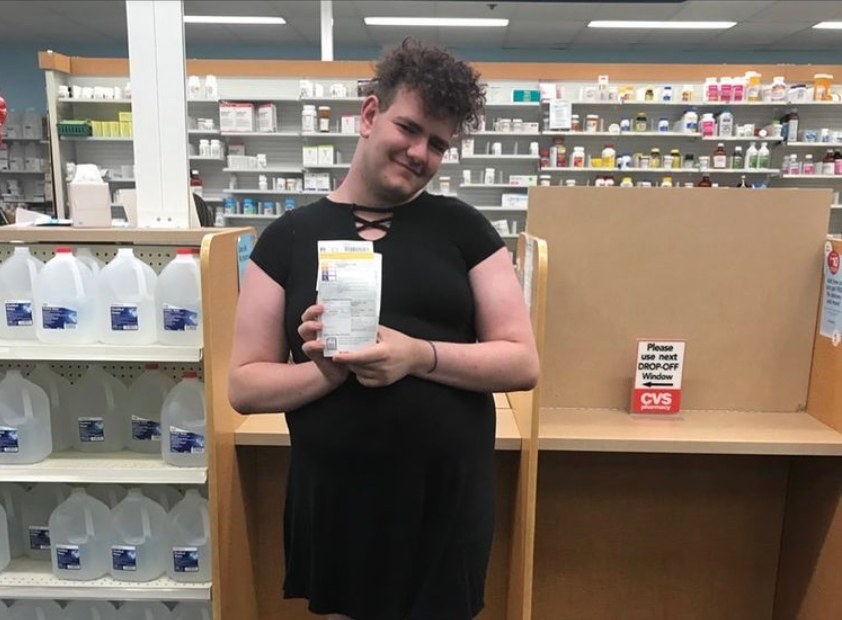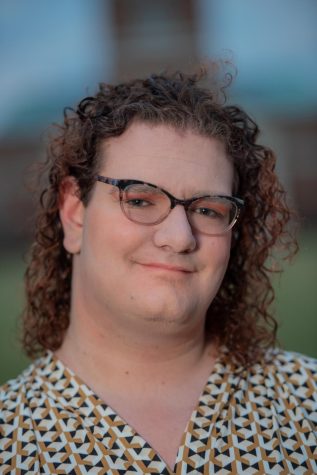Transgender children deserve access to procedures
Children who come to terms with their identity at an early age should not be forced to live cis-heterosexual lives
A 16 year-old Aine Pierre poses with her first dose of hormones at CVS.
March 3, 2022
For LGBTQ+ people, especially transgender youth a storm is brewing in the United States.
On Friday, Feb. 18, Texas Attorney General Ken Paxton wrote in an opinion that providing or abetting gender-affirming treatment in transgender youth was child abuse. Governor Greg Abbott followed this statement last Wednesday in a letter to Texas’s Family and Protective Services director, in which he ordered investigations into any parents who have allowed their children to undergo procedures like the ones Paxton outlined.
In Florida last week, a bill aimed at preventing teachers from discussing queer issues in the classroom passed the state’s House of Representatives. On Monday, Feb. 28, the Florida Senate passed the “Don’t Say Gay” Bill. It now is heading to the desk of Governor Ron DeSantis, who is expected to sign it.
Anti-queer — specifically anti-trans — policies are nothing new. Throughout the last few years, Republicans in state legislatures across the country have made political hay out of the daily lives of trans folk. In 2016, North Carolina led this charge, passing a bill — HB2 — which forced everyone in the state to use a restroom that corresponded with the sex on their birth certificate and not the gender identity to which they ascribed.
That bill was repealed, but the damage was done: anti-trans legislation had already become a new front line in the culture wars.
Efforts to isolate transgender children from the care they need are especially concerning. Proponents of policies like those in Texas say they are concerned that children may make the wrong decision and end up regretting transition, and thus, it is better to wait until they are older to start care. Proponents of laws like the one currently before the Florida legislature say that schools are no place to learn about complications in gender and sexuality. However, forcing queer children to live cis-heterosexual lives in a completely cis-heterosexual world is not the “safe” alternative one might expect.
I was 13 when I first heard the term transgender from an internet friend, and suddenly, everything about my life — especially the enduring sense that my body and my life just did not fit in with who I was and wanted to be — made complete sense. However, by that time, I had already completed male puberty, and it was too late to arrest the development of my deep voice and hairy face that I loathed.
Maybe if I had learned about gender identity in school, then I could have come home and told my parents who I was earlier. I may have been spared years of torment from my own body. Florida, Texas and states taking similar actions, are ensuring that their transgender children will have to go through what I went through.
Forbidding access to these — completely reversible — treatments to those who were lucky enough to figure out who they were at such a young age is nothing short of unconscionable. Forcing parents, under threat of being arrested for child abuse, to watch their child’s body develop in a way that is actively hostile to their very being, is cruel, too.
Another main argument against transgender children being allowed to live their lives is that we will be trapped in a world obsessed with pronouns and gender identity. To that, I say we already are. Any Women, Gender and Sexuality Studies (WGSS) class would tell you that sex and gender are socialized to an insane degree, but if you think WGSS classes are just liberal propaganda, at least take heed of a story from October 2018. In the midst of a lockdown, a transgender student in Oklahoma was forced to stand out in the open because school administrators could not decide whether to shelter her with the boys or the girls. Our society is already obsessed with gender, so we may as well obsess with our minds as open as possible.
When I was 15, I finally told my mother the truth about who I was. I told my teachers, too. All of them welcomed me with open arms, discussed logistical issues with me earnestly and went to bat for me when anyone wanted to mess with me because I was transgender.
When I was 16, I ran to hug my mother after receiving my first CVS bag full of estrogen.
When I was 17, my mother took me out of school to attend the court session during which my legal name change was approved.
My mother’s affirmation of who I am brought us closer together and was the furthest thing in the world from abuse. My teachers’ candidness with me about being queer in school helped me navigate through what would otherwise have been an awful time. The thought of either of those being considered illegal breaks my heart.
Lastly, to President Joe Biden, who said in his first address to Congress last April and his State of the Union Tuesday night that he had our back: now would be a great time to show it.
Editor’s Note: This opinion was written and scheduled for publication before the Justice Department announced policies that would support parents of transgender children in Texas.















